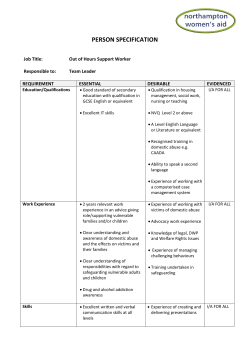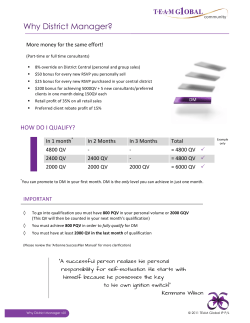
Qualification element - version 4.0
ISB Technical Data Standard ISB-000228 Qualification Element Version: 4.0 Issue Date: 27/03/2015 Document Version History Version Status BDS Approval Date TDS Issue Date Modified by Description 1.0 Approved: 23/07/2013 Recommended 04/12/2013 ISB New TDS 2.0 Approved: 17/02/2014 Recommended 07/04/2014 ISB See changes from previous version section 3.0 Approved: 18/11/2014 Recommended 08/12/2014 ISB Make the choice node following the QualificationElement_CN element sequence optional 4.0 Approved: 24/02/2015 Recommended 27/03/2015 ISB Add elements QE_Admin_Code and Assessment_Medium_Type. © Crown copyright 2015 ISB-000228 - Qualification Element Contents 1 Data Standard ______________________________________________________________________________________ 3 1.1 1.1.1 1.1.2 Introduction_______________________________________________________________________________________________ 3 Application _________________________________________________________________________________________________________ 3 Compatibility with non-ISB standards ____________________________________________________________________________________ 3 2 XSD_______________________________________________________________________________________________ 4 3 XSD Normalisation __________________________________________________________________________________ 5 4 3.1 Introduction_______________________________________________________________________________________________ 5 3.2 Details of Normalisation specific to Qualification Element ___________________________________________________________ 5 XSD Optimisation ___________________________________________________________________________________ 7 4.1 Introduction_______________________________________________________________________________________________ 7 4.2 Details of Optimisation specific to Qualification Element ____________________________________________________________ 7 5 Changes from previous version _______________________________________________________________________ 9 6 References _________________________________________________________________________________________ 9 7 Notes _____________________________________________________________________________________________ 9 8 Copyright Notice ___________________________________________________________________________________ 10 File: TDS-Qualification-Element Page 2 of 10 Version: 4.0 Issue Date: 27/03/2015 Status: Approved: Recommended ISB-000228 - Qualification Element 1 DATA STANDARD 1.1 Introduction 1.1.1 Application This Technical Data Standard (TDS) binds the Qualification Element Business Data Standard (BDS) to an XML Schema (XSD) representation. This standard defines a building block from which qualifications can be defined. The Qualification Element (QE) can represent an option, module, unit, component of a qualification. The QE is also used to define assessables eg examinations, performances etc and the rules of combination of QEs for a Qualification. More formally: A Qualification Element describes a statement of achievement or knowledge which can be verified. A Qualification Element must always be one of the following subtypes: • • • • • Assessable – a part of a qualification structured representing an area of knowledge or capability that is discretely assessed Award – a part of a qualification structure that is certificated or enterable or reportable Learning Unit – a sub-division of a qualification to assist in the purposes of learning and assessment of knowledge or capability Pathway – a part of a qualification structure that groups together other Pathways, Assessable or Learning Units and contains the selection criteria to control the pathways available when making a booking for a qualification. May be referred to as rules of combination. Scheme – a part of a qualification structure comprising interrelated attributes that describe the overall behaviour of the structure A Qualification Element may be related to one or more other Qualification Elements by means of a QE Relationship. QE Relationships are combinations of Scheme, Award, Pathways, Learning Units and Assessable that must be linked together in a qualification structure. 1.1.2 Compatibility with non-ISB standards There are no known compatibility issues related to this standard. File: TDS-Qualification-Element Page 3 of 10 Version: 4.0 Issue Date: 27/03/2015 Status: Approved: Recommended ISB-000228 - Qualification Element 2 XSD File: TDS-Qualification-Element Page 4 of 10 Version: 4.0 Issue Date: 27/03/2015 Status: Approved: Recommended ISB-000228 - Qualification Element 3 XSD NORMALISATION 3.1 Introduction This section defines normalisation that has been applied. The Business Data Standard data model may contain multiple entities that inherit primary keys from a parent entity. In this situation the same primary keys will occur in multiple entities. If this pattern was translated directly to the xsd then the same primary key element(s) would be repeated within the xsd. When parsing the xml, if the element was referenced without xpath then the particular instance of the repeated primary key element could not be determined. If all instances of the repeated primary key element(s) contained the same value then there would not be an issue. However, if there were different values in the repeated primary key element(s) then the value to be returned would be indeterminate. To prevent this situation the conversion from the Entity Relationship Diagram (ERD) model to the xsd involved normalisation to remove the repetition. This results in nodes being created in the xsd to define primary keys once and sub-nodes created that inherit those keys. This section will identify any normalisation that has taken place and how it has been implemented in the schema. 3.2 Details of Normalisation specific to Qualification Element The Qualification Element design is a supertype/subtype design and as such an instance of the supertype is always accompanied by a subtype. The primary keys of that occur in both the super and subtypes are: • Awarding Organisation Party Id • AO Qualification Element Id • Qualification Element Type These primary keys are normalised in the schema by creating a single set of mandatory identifying elements under the QualificationElement node and QualificationElement_CN node. The supertype Qualification Element entity attributes are defined under the QualificationElement_CN node. The subtypes of Scheme, Award etc. are then set as choice nodes so that the result is: • A single set of identifying elements File: TDS-Qualification-Element Page 5 of 10 Version: 4.0 Issue Date: 27/03/2015 Status: Approved: Recommended ISB-000228 - Qualification Element • A single set of attributes for the supertype Qualification Element • A choice of either Scheme, Award, Assessable, Learning Unit or Pathway There is a separate node under the QualificationElement_DS for the QE Relationship entity elements. As the content model has both the Qualification Element and the QE Relationship and either could be sent, the QualificationElement and QERelationship complex elements nodes are both optional. As both nodes could be sent they cannot be defined as choice elements. File: TDS-Qualification-Element Page 6 of 10 Version: 4.0 Issue Date: 27/03/2015 Status: Approved: Recommended ISB-000228 - Qualification Element 4 XSD OPTIMISATION 4.1 Introduction This section defines optimisation that has been applied to the xsd. The Business Data Standard data model may contain compound keys made up from a number of attributes. The sequence of the attributes in the Business Data Standard data model is defined to identify any opportunities for optimisation in encodings that can accommodate that capability. An example is where the primary key contains the values of Party_Id and then Event_Id. This implies that a single Party_Id may have many Event_Ids. Encodings that can accommodate optimisation can define the Party_Id once and then under that have many Event_Ids. For xml encoding, a single Party_Id element node can be defined with an unbounded list under that node for the Event_Ids. This reduces the amount of data redundancy. 4.2 Details of Optimisation specific to Qualification Element The Qualification Element structure is optimised as follows: • Under the QualificationElement node there is compound primary key set (1) containing: o Awarding_Organisation_Party_Id • Under the above primary key set (1) there are multiple instances of QualificationElement_CN node that holds the further primary key set (2) containing: o AO_Qualification_Element_Id o Qualification_Element_Type • Therefore for one instance of primary key set (1) there are multiple instances of primary key set (2) The QE Relationship is not optimised. When creating data for the Qualification Element primary keys there are two options available that both satisfy the xsd • Option 1 – One Awarding_Organisation_Party_Id with many QualificationElement_CN File: TDS-Qualification-Element Page 7 of 10 Version: 4.0 Issue Date: 27/03/2015 Status: Approved: Recommended ISB-000228 - Qualification Element • Option 2 – One Awarding_Organisation_Party_Id with one QualificationElement_CN Option 1 utilises the optimisation as there will be one Awarding_Organisation_Party_Id with all of its QualificationElement_CN(s) Option 2 does not use the optimisation and repeats the Awarding_Organisation_Party_Id against each QualificationElement_CN Providing Option 1 is coded for in the Application then either Option 1 or 2 Option can be supported. However, this is not true if Option 2 only is coded for as the program will not hold the Awarding_Organisation_Party_Id in memory for use against each of its QualificationElement_CN(s). The recommendation is always to code for the optimisation method Option 1. File: TDS-Qualification-Element Page 8 of 10 Version: 4.0 Issue Date: 27/03/2015 Status: Approved: Recommended ISB-000228 - Qualification Element 5 CHANGES FROM PREVIOUS VERSION Add element QE_Admin_Code to sequence following QualificationElement_CN element. Data type string, optional. Add element Assessment_Medium_Type to sequence following element Assessable. Data Type string, optional. 6 REFERENCES The following references are specific to this Technical Data Standard: • ESCS ISB Consolidated XML (XSD) Schema, version 2.0 • ESCS ISB Business Data Architecture Entity Relationship Diagram, version 9.01 • ESCS ISB XSD Content Model, version 1.15 • ESCS ISB, Business Data Standard, Qualification Element The following references apply to all Technical Data Standards: 7 • ESCS ISB Standards Overview and Context • ESCS ISB “System“ Enterprise Architecture - Business Data Architecture • ESCS ISB Business Data Architecture Data Types • ESCS ISB BDA Data Architecture Modelling Standards • ESCS ISB Management Process NOTES None. File: TDS-Qualification-Element Page 9 of 10 Version: 4.0 Issue Date: 27/03/2015 Status: Approved: Recommended ISB-000228 - Qualification Element 8 COPYRIGHT NOTICE © Crown copyright 2015 The Information Standards Board (ISB) is an advisory body to the Department for Education (DfE) and the Department for Business, Innovation and Skills (BIS). The information it produces is subject to Crown copyright, which is administered by the National Archives. The Crown copyright protected information in this document (other than ISB or Departmental logos) may be reproduced free of charge in any format or medium under the terms of the Open Government Licence, available from the National Archives website. Any reuse is subject to the material being reproduced accurately and not used in a misleading context. It must be acknowledged as being protected by Crown copyright and the title of the source material must be supplied with the ISB named as the corporate author. Authorisation to reproduce any information which is identified as being the copyright of a third party must be obtained from the copyright holders concerned. File: TDS-Qualification-Element Page 10 of 10 Version: 4.0 Issue Date: 27/03/2015 Status: Approved: Recommended
© Copyright 2025









